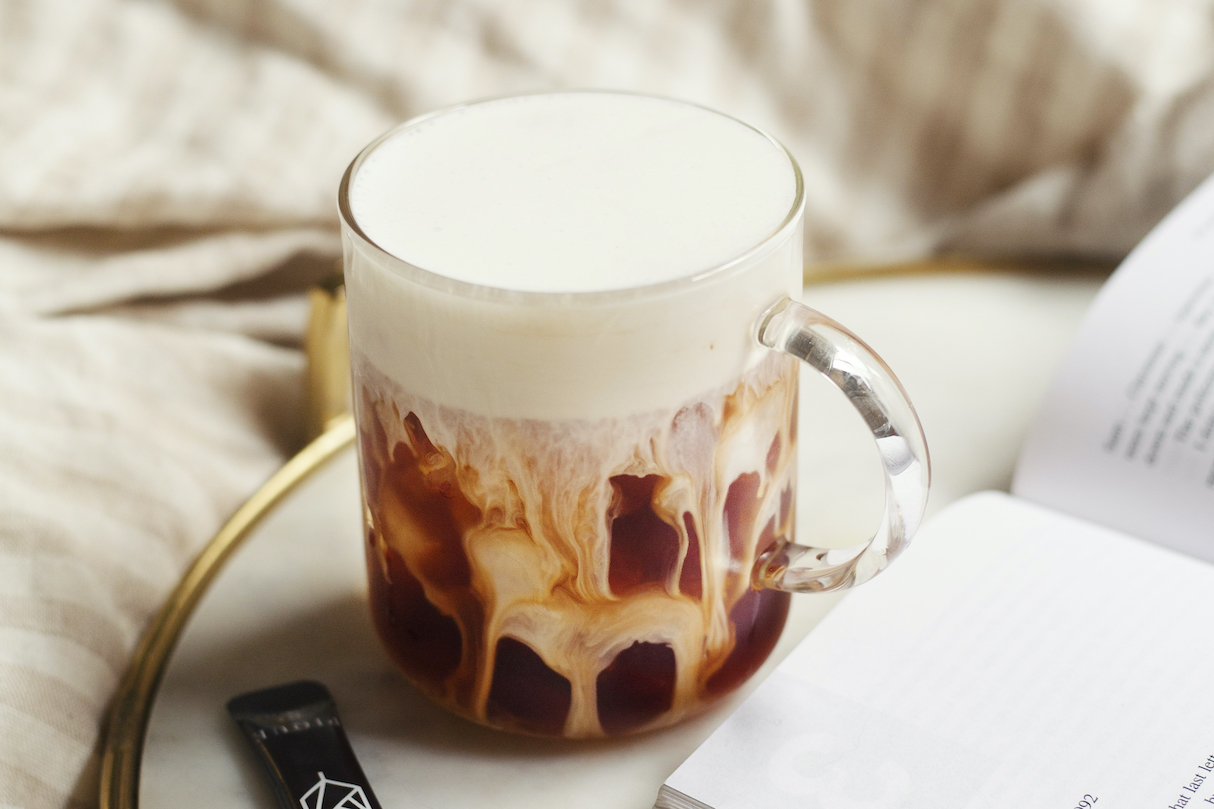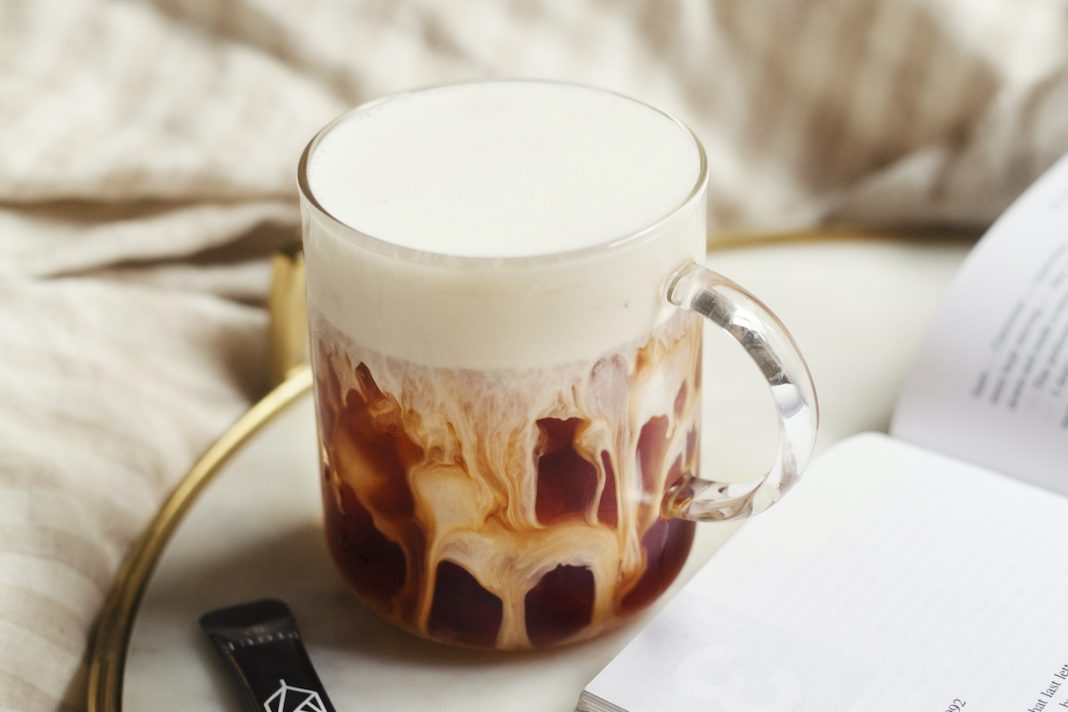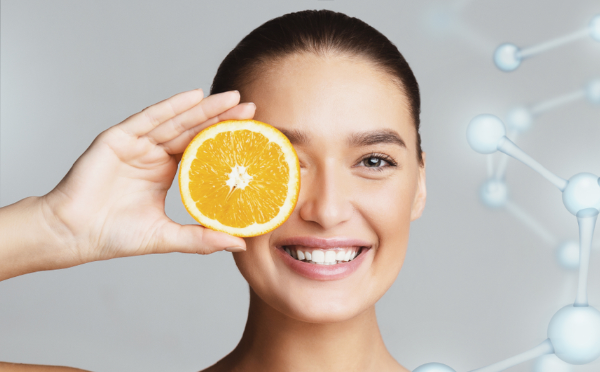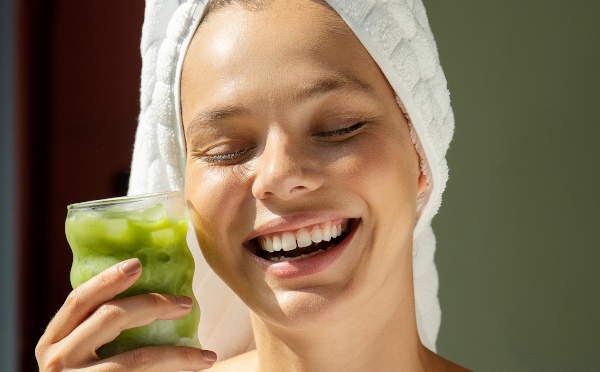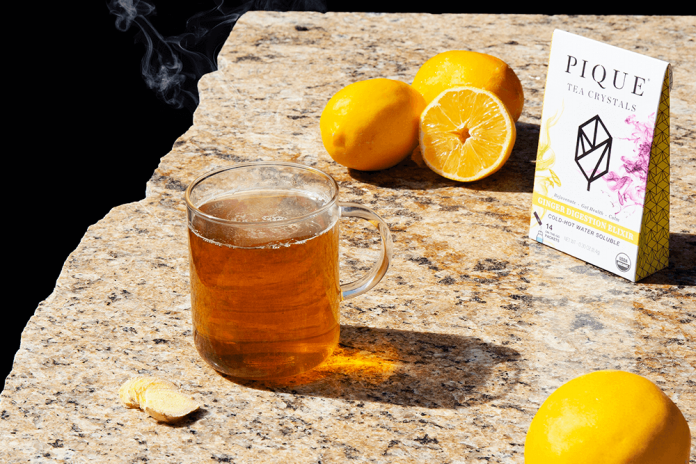What’s your biggest motivation for drinking tea?
Caffeine might not be the main reason, but for most tea drinkers, it’s a welcome aid for alertness, productivity, and cognitive support.
The caffeine content of true teas varies based on multiple factors, including maturity of the tea plant, harvest season, and processing that takes place after harvest.
In this article, we’ll dive into the caffeine content of various true teas from the Camellia sinensis family. But first, let’s begin by looking at some special qualities of the tea plant that distinguish it from coffee and other caffeine sources.
How Caffeine in Tea Differs from Caffeine in Coffee
Caffeine has a variety of effects on your mind and body. To name a few, it reduces drowsiness and fatigue, increases alertness, elevates your heart rate, and can even cause fidgeting behaviors, especially at higher doses. (1)
Two of the most common caffeine sources are coffee and tea. But have you noticed that the stimulating effects of tea feel different from those of coffee?
Whereas people often describe the effects of coffee as “jolting,” “harsh,” or “jittery,” tea can be subtler and mellower, perhaps providing steadier energy levels with less of a “crash.”
Both types of beverages contain caffeine, so what gives?
Although some sources show that your body absorbs caffeine similarly from coffee and tea, there’s also plenty of evidence that suggests tea-drinking leads to unique sensations and effects. (2)
Tea caffeine is a uniquely sustainable, time-released energy source. Caffeine in tea is bound to catechins to form a larger combined compound. This larger compound takes longer for your body to break down and metabolize compared to caffeine alone, so tea caffeine is actually released in microdoses over 4-6 hours. (30) This is why energy from tea lasts longer without the spikes, crashes and jitters of coffee.
Keep reading to learn more about why the caffeine in tea feels different from coffee and other drinks!
L-Theanine Content
The calming amino acid l-theanine is the reason people sometimes call tea “meditation in a cup.”
It occurs naturally in true teas (the highest levels are found in shade-grown matcha) but not coffee, and is one of the factors behind the different buzz of each beverage. (3)
First of all, l-theanine and caffeine have somewhat opposing effects. In contrast to the stimulant effects of caffeine, research shows that relaxing l-theanine can reduce the effects of stress, support a lower heart rate, calm the nervous system, and help support healthy blood pressure levels. (4)(5)
But fascinatingly, the combined effects of caffeine and l-theanine act together to support brain alpha wave activity, which researchers refer to as a state of “alert relaxation” or calm focus. (6)(7)
Studies show the combination also supports a positive mood, healthy stress management, and sustained focus on tasks. (8)(9)
L-theanine can also reduce the typical stimulant effects associated with caffeine, which is likely the reason why tea has a gentler effect on your nervous system than other caffeinated beverages. (7)
Essentially, l-theanine takes the edge off caffeine and mellows it out.
Psychoactive Antioxidants
It turns out that EGCG and other tea catechins may have psychoactive effects, too.
Most people (correctly) associate polyphenol antioxidants with the widely-documented health benefits of tea. However, research shows catechins and other polyphenols might also be capable of interacting with your brain and influencing the way tea makes you feel!
A 2009 in vitro cell study published in the journal Phytomedicine concluded that EGCG possesses an affinity for endocannabinoid receptors, especially type 1 (CB1) receptors. (10)
The CB1 receptors occur primarily in your brain, where they appear to affect relaxation, sociability, and other cognitive effects. (11)(12)
And according to a 2017 scientific review of 49 human studies, here are some other potential cognitive and emotional benefits of EGCG (13):
- Supporting cognitive performance
- Supporting blood flow to the brain
- Supporting a calm, positive mood
- Supporting stress reduction
Lastly, EGCG may help support alpha waves independently of l-theanine (and indeed, could help increase the effects of l-theanine in tea). (14)
As the authors of a 2018 paper shared, “EGCG may reduce the negative mood effects of caffeine in a similar manner to l-theanine.” (14)
To sum up, researchers aren’t entirely sure of all the mechanisms yet, but antioxidants in tea do appear to alter the cognitive and mood effects of caffeine compared to drinks like coffee.
Methylxanthines and Caffeine Analogues
Caffeine belongs to a family of chemicals called methylxanthines, and tea and chocolate both contain additional naturally-occurring molecules that are related to caffeine.
The methylxanthines theophylline and theobromine are structurally similar to caffeine, and also possess stimulant effects. (15)
However, the stimulant effects of these caffeine analogues are not identical to caffeine. (16)
One study found that while tea contains low levels of other methylxanthines, coffee typically does not. (16)
Therefore, the different caffeine analogue content in tea could be another reason why tea-drinking offers a distinct feeling compared to consuming coffee.
How Much Caffeine is in Tea?
Did you know that dry tea leaves actually contain more caffeine than ground coffee beans?
One study comparing the caffeine content of different types of tea leaves to that of coffee beans discovered that the tea leaves contained as much as 30-100% more caffeine by weight. (16)
Of course, prepared tea is nearly always lower in caffeine than prepared coffee, since tea is usually steeped with 2-3 grams of tea per eight-ounce cup, whereas a cup serving of high-end coffee is likely to contain 10-14 grams of ground beans.
Finally, while tea steeping is relatively straightforward, not all coffee prep methods extract equivalent amounts of caffeine–espresso and instant coffee contain far more caffeine than other coffee preparations due to how they’re made, for example. (16)
Caffeine in White Tea
Surprisingly, the caffeine content of white tea can vary considerably.
One study found a range of 30-90 mg caffeine per cup of high-quality brewed white tea, depending on the variety. (17)
A possible reason that caffeine in white tea feels so gentle, as we discussed earlier, could be due to its unusually high levels of EGCG and other polyphenol antioxidants.
Caffeine in Green Tea
Similar to white tea, different green tea leaves have a wide range of caffeine content. (18)
One cup of green tea can contain anywhere from 44-81 mg of caffeine, depending on the tea. (17)(19)
Caffeine in Pu’er Tea
The caffeine content of pu’er tea depends on how long it’s aged. Aged pu’er has less caffeine.
A cup of ripe pu’er tea contains 32-45 milligrams of caffeine. (20) In contrast, a cup of aged pu’er tea only contains 20-30 mg. (20)
Caffeine in Oolong Tea
A typical cup of oolong tea contains 40-55 milligrams of caffeine. (21)
Caffeine in Black Tea
Black tea is the most popular type of tea worldwide. It’s what many people think of when they think of tea, and it includes variations like Earl Grey and English breakfast tea.
While some green tea varieties actually have more caffeine by dry weight relative to black tea, steeped black tea’s higher water temperatures and longer brewing times may account for its increased caffeine levels. (18)(19)(22)
High-quality black tea from Ceylon contains about 95 milligrams per cup, while tea from Assam has around 85 milligrams. (23)
For most black teas (including Earl Grey and English breakfast) you’re likely getting somewhere between 60-85mg caffeine per cup. (22)
Caffeine in Matcha Tea
Matcha is our favorite high-caffeine tea, hands-down.
A one-cup serving of matcha, made with a teaspoon of matcha powder, contains between 75-130 mg of caffeine and up to 130 mg of l-theanine (as long as it’s high-quality, shade-grown matcha). (24)
To top things off, you drink the entire tea leaf in finely-ground form when you drink matcha. As opposed to other forms of tea that you steep and remove before drinking, that means you’re ingesting 100% of the caffeine, theanine, and antioxidants in matcha.
Is Caffeine in Tea Safe?
Caffeine is a psychoactive drug–the most commonly used one in the world, as a matter of fact. (25) And as with any such substance, avoiding overconsumption is the healthiest approach.
As long as you limit your caffeine intake to 400 milligrams per day for men or 300 milligrams per day for women, research shows that caffeine is safe for most people. (25)
And research shows that sometimes, lower doses of caffeine (32 mg vs 64-256 mg) outperform higher doses in terms of boosting mood and alertness. (26)(27) So you really don’t need mega-doses to get the majority of caffeine benefits, anyway.
However, some people are extra-sensitive to the effects of caffeine. And pregnant or nursing women should probably avoid caffeine altogether, as should children. (25)
Talk to your doctor about using caffeine if you have a medical condition, take medication, or are a senior citizen.
Caffeine Side Effects
Common caffeine side effects include nervousness, fidgeting, jitters, or restlessness. (25)
Fortunately, most of them only occur at high doses. If you experience the above side effects, try cutting back on your tea drinking (or switch to a variety with less caffeine).
But have you heard that caffeine acts as a diuretic, dehydrating you by increasing urination? This supposed side effect is 99% myth, 1% truth.
Research shows that at normal consumption levels, caffeine in beverages like tea has little or no meaningful diuretic effect. (28)
And importantly, for habitual tea drinkers, there’s zero chance that your normal caffeine intake will dehydrate you. After a few days of caffeine consumption, your body adjusts for any mild diuretic effects and learns to stay hydrated despite the caffeine. (28)
As a result, tea is a perfectly acceptable choice for a refreshing, hydrating beverage–especially if you drink it regularly.
Lastly, research suggests that 100 milligrams of caffeine before bed can delay your sleep schedule. (29) (Anecdotally, some people experience sleep disruption with much lower levels of caffeine, too.)
That’s why, regardless of the fact that it feels gentle, we don’t recommend drinking true tea in the evening or before bed.
If you want something to help you wind down at night, try a delicious, caffeine-free herbal tea before bed instead.
Final Thoughts
Caffeine is just one of many reasons to drink tea–and there’s a scientific reason why drinking it makes you feel differently than when drinking coffee.
Tea’s l-theanine, methylxanthines, and even EGCG and other catechins and antioxidants act in concert with caffeine to create the unique, delightful sensations we associate with tea-drinking.
While there’s some truth to the “common knowledge” about tea types and their caffeine contents, you’re better off not assuming. Instead, try different reputable teas, discover your favorites, and listen to your body to learn what’s right for you.
Tea Crystals offer a significant advantage in that they’re consistent, high-quality, and take the guesswork out of choosing, measuring, and preparing tea. That means the caffeine doesn’t vary significantly from cup to cup.
